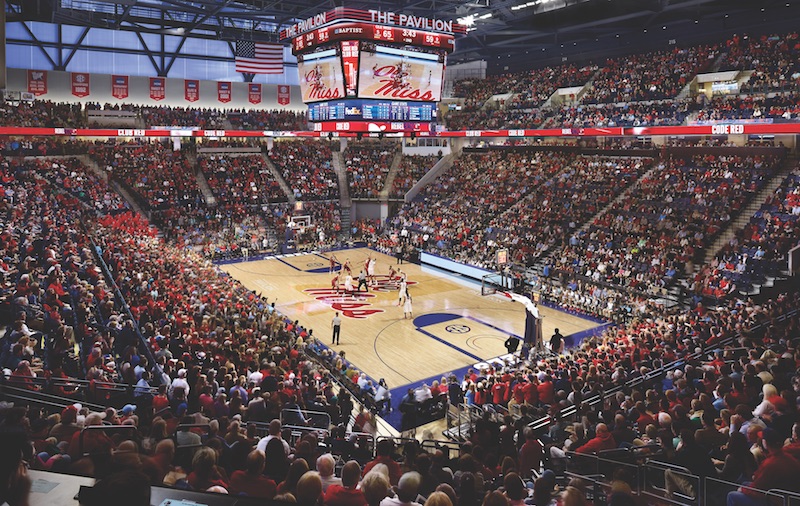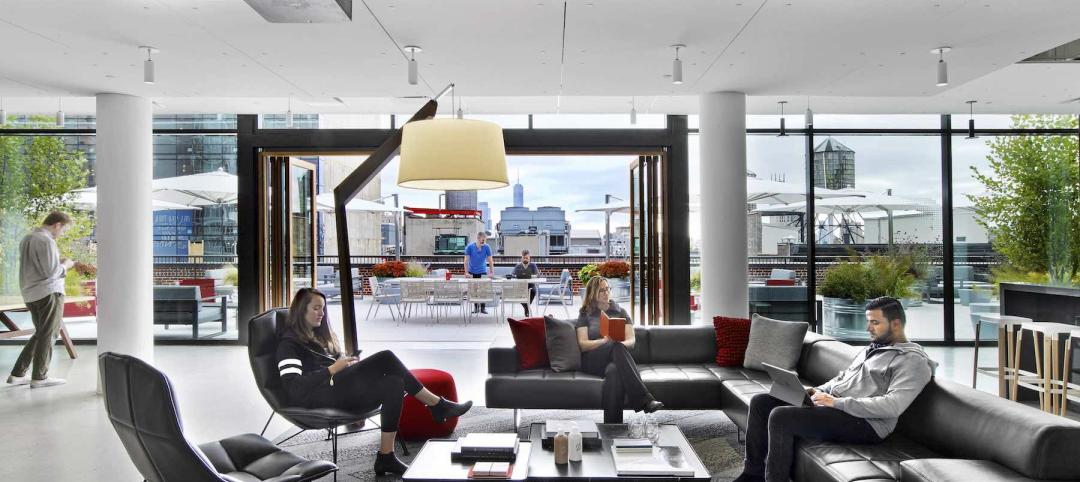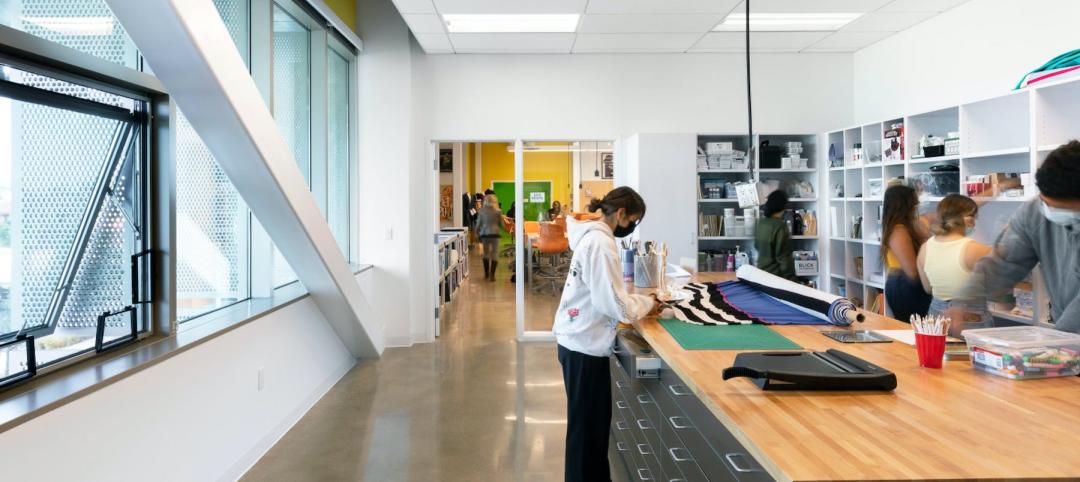The University of Nebraska Omaha’s hockey program has experienced modest success since its establishment in 1997, but last year marked the Crimson and Black’s first brush with the elite. The Mavericks reached the 2015 NCAA Frozen Four, the semifinal round of the NCAA Men’s Division I Ice Hockey Tournament.
TOP 50 SPORTS FACILITY ARCHITECTURE FIRMS
Rank, Firm, 2015 Revenue
1. Populous $113,741,160
2. HKS $81,220,737
3. HOK $58,589,000
4. Gensler $42,850,000
5. HNTB Corporation $13,419,171
6. Cuningham Group Architecture $10,238,235
7. Moody Nolan $9,800,000
8. Sink Combs Dethlefs $9,719,919
9. VOA Associates $9,577,715
10. Stantec $8,654,844
TOP 60 SPORTS FACILITY CONSTRUCTION FIRMS
Rank, Firm, 2015 Revenue
1. Mortenson Construction $837,136,000
2. AECOM $692,550,000
3. Turner Construction Co. $452,522,888
4. PCL Construction Enterprises $368,505,497
5. Manhattan Construction Group $277,528,000
6. Barton Malow Co. $266,882,651
7. Holder Construction Co. $154,000,000
8. Skanska USA $150,328,639
9. Brasfield & Gorrie $141,714,487
10. Pepper Construction Group $129,770,000
TOP 30 SPORTS FACILITY ENGINEERING FIRMS
Rank, Firm, 2015 Revenue
1. AECOM $30,000,000
2. Thornton Tomasetti $21,316,147
3. ME Engineers $18,950,000
4. Walter P Moore $18,678,163
5. WSP | Parsons Brinckerhoff $18,245,000
6. Henderson Engineers $18,179,333
7. Smith Seckman Reid $7,981,930
8. Jacobs $6,930,000
9. Magnusson Klemencic Associates $4,134,707
10. KJWW / TTG $3,320,000
UNO hockey’s good times keep rollin’ on. Last fall, the school opened the $86 million, 220,000-sf Baxter Arena, the team’s new home. Designed by HDR and Lempka Edson Architects, the 7,898-seat arena has 17 luxury suites, 750 club seats, and a 750-seat student section. Open concourses let fans see the game even when standing in line for concessions. A split bowl design keeps spectators on top of the ice.
The arena, which also hosts basketball and volleyball, isn’t just for UNO sports. The building is a focal point for the entire community. An attached community ice rink stands at the front of the building. (The UNO varsity plays on the main rink.) The public can access the community rink for open skate, curling, and club hockey. With 25-to-30-foot floor-to-ceiling windows, light is drawn in during the day; at night, visitors outside the building can peer in and see the ice.
In addition to concerts, shows, and lectures, Baxter Arena has emerged as the preferred setting for local graduation ceremonies. The Omaha World-Herald reported that 13 area high schools booked the arena for commencements this spring. The arena’s seating capacity is comfortably in between constrictive and cavernous. Free parking for 2,400 vehicles will easily accommodate all its guests.
Other schools are renovating existing structures or building new sports facilities that can serve the student body and surrounding community.
GAINING YEAR-ROUND USE
The 9,500-seat Pavilion at Ole Miss, in Oxford, Miss., opened in January. Home to the Rebels’ men’s and women’s basketball teams, the University of Mississippi’s multipurpose arena, designed by AECOM, also hosts concerts, events, and academic and student activities. A retractable lower bowl allows seating for group lectures and convocations.
The Pavilion Club on the eastern side of the arena serves as multi-use club space between basketball and football seasons. Since it’s right across a walkway from Vaught Hemingway Stadium, it will be a pre-game and game club during football season.
Even on non-game days during the week, students can access a food court just inside the north arena entry. It features two concession stands and comfortable seating, with a covered exterior plaza space.
MIXING SPORTS AND ACADEMICs in south bend
The University of Notre Dame is undertaking an even more complex sports/academic project. The South Bend, Ind., school is in the throes of turning Notre Dame Stadium into the hub of the campus. Total stadium capacity is being enlarged by 3,000–4,000 seats. Vinyl-clad benches are replacing wood bench seats, and a new video board and ribbon boards are being installed.
But the upgrade doesn’t stop at the stadium ticket window. Three new academic buildings are being built onto the stadium. The Campus Crossroads Project will add more than 800,000 sf of classroom, research, digital media, event, and student life space.
Nate Appleman AIA, LEED AP, HOK’s Director of Sports, Recreation, and Entertainment, says university officials looked at the site and determined that they had the room to turn the site into a focal point right in the core of campus. He says the question became, How does Notre Dame capitalize on that?
The nine-story Duncan Student Center sits on the west side. The first five floors contain fitness facilities, lounges, a meeting room, a career services center, a dining area, and a ballroom. The upper floors have gameday features like premium seating and booths for coaches and media.
The nine-story Corbett Family Hall, which houses the anthropology and psychology departments and a digital media center, sits on the east side. Its upper levels have the stadium press box, outdoor club seating, and club space. The seven-story Music and Sacred Music hall for the Department of Music and the Sacred Music program is located to the south. That facility has recital and rehearsal halls, a music library, and a lounge. Mechanical space for the scoreboard and football operations is on the uppermost story.
HOK was the sports, recreation, and hospitality consultant to S/L/A/M Collaborative (design architect). HOK designed in-stadium features, such as n loge boxes and press facilities. The new HOK-designed Student Recreation Center in the Duncan Student Center features an indoor track, a four-story climbing wall, boxing areas, and training turf. The facility triples the amount of fitness space available to students. The firm also designed terraces on each building that will offer views of the playing field and campus.
Appleman says that the concept of making a stadium into an environment that’s inhabited 365 days a year as a campus core building is an idea that’s replicable.
“This is going to be something that’s going to spread like wildfire throughout the college landscape, no doubt,” he says.
RETURN TO THE GIANTS 300 LANDING PAGE
Related Stories
| Aug 11, 2022
Report examines supposed conflict between good design and effective cost management
A report by the American Institute of Architects and the Associated General Contractors of America takes a look at the supposed conflict between good design and effective cost management, and why it causes friction between architects and contractors.
Architects | Aug 11, 2022
Mancini Duffy Bill Mandara on expanding through diversification
In this segment for HorizonTV, BD+C's John Caulfield interviews Mancini Duffy's CEO and Co-owner William Mandara about his firm's recent growth, which includes an acquisition and new HQs office.
Energy Efficiency | Aug 11, 2022
Commercial Energy Efficiency: Finally “In-the-Money!”
By now, many business leaders are out in front of policymakers on prioritizing the energy transition.
High-rise Construction | Aug 11, 2022
Saudi Arabia unveils plans for a one-building city stretching over 100 miles long
Saudi Arabia recently announced plans for an ambitious urban project called The Line—a one-building city in the desert that will stretch 170 kilometers (106 miles) long and only 200 meters (656 feet) wide.
| Aug 10, 2022
U.S. needs more than four million new apartments by 2035
Roughly 4.3 million new apartments will be necessary by 2035 to meet rising demand, according to research from the National Multifamily Housing Council (NMHC) and National Apartment Association.
| Aug 10, 2022
Gresham Smith Founder, Batey M. Gresham Jr., passes at Age 88
It is with deep sadness that Gresham Smith announces the passing of Batey M. Gresham Jr., AIA—one of the firm’s founders.
| Aug 9, 2022
Work-from-home trend could result in $500 billion of lost value in office real estate
Researchers find major changes in lease revenues, office occupancy, lease renewal rates.
| Aug 9, 2022
5 Lean principles of design-build
Simply put, lean is the practice of creating more value with fewer resources.
| Aug 9, 2022
Designing healthy learning environments
Studies confirm healthy environments can improve learning outcomes and student success.
Legislation | Aug 8, 2022
Inflation Reduction Act includes over $5 billion for low carbon procurement
The Inflation Reduction Act of 2022, recently passed by the U.S. Senate, sets aside over $5 billion for low carbon procurement in the built environment.

















